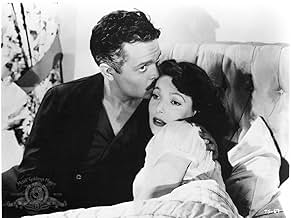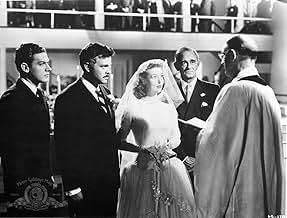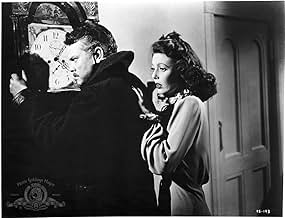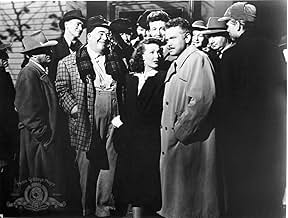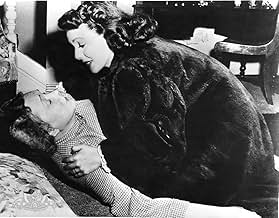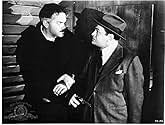An investigator from the War Crimes Commission travels to Connecticut to find an infamous Nazi.An investigator from the War Crimes Commission travels to Connecticut to find an infamous Nazi.An investigator from the War Crimes Commission travels to Connecticut to find an infamous Nazi.
- Nominated for 1 Oscar
- 2 nominations total
David Bond
- Student
- (uncredited)
John Brown
- Passport Photographer
- (uncredited)
Nancy Evans
- Undetermined Role
- (uncredited)
Adolph Faylauer
- War Crimes Commision Member
- (uncredited)
Fred Godoy
- Undetermined Role
- (uncredited)
Theodore Gottlieb
- Fairbright
- (uncredited)
Joseph Granby
- Undetermined Role
- (uncredited)
Ethan Laidlaw
- Todd
- (uncredited)
Featured reviews
This film has been knocked by many people saying that Orson Welles was forced to work within the strict confines of the Hollywood system. I have absolutely no problem with this. Welles is a master craftsman. He made great films, period. In an interview he said that the studio cut out " a couple of reels" that take place in South America at the beginning of the story that he felt was the best part of the movie. As a viewer I feel that the film is compact and taut. Adding more to it would not help(in my opinion). On the contrary, I think adding more might make the film sluggish. As it stands the film remains dark. You feel that evil is present. You are just not sure what is going to happen next.
The performances in this film are for the most part excellent. Edward G. Robinson is amazing. This could have been a cardboard thin good-guy part. Instead he turns the character of Wilson into a smart, cunning hero. He is self-assured not obsessed. He understands what most people in the town don't: Kindler is a monster who is capable of anything. To catch such a man you have to be several steps ahead of him. Also excellent is Konstantin Shayne as Meinike. You can see the fear and madness in his eyes as he repeats "I am travelling for my health, I am travelling for my health..." before going through customs. Make no mistake, this man is "an obscenity that must be destroyed" to quote Wilson. Just look at his scene with the photographer in South America. He is used to people following his orders. Welles is also very good as Kindler/Rankin. There are moments that you actually feel sympathy for him. His obsession with fixing the town clock is very significant. Here is a man who needs things to be precise and structured. He wants total control of his environment(a good example is how he treats his wife). Welles hints at this man's mania but keeps him human. Even though you want him to be caught, you can't help wondering if he'll get away. Loretta Young is unfortunately just average in this film. She has some good moments (especially in the final scene when she confronts Rankin/Kindler)but her hysterics are just too much. The scene where Wilson is showing her the Nazi atrocities is well played. She keeps a certain composure that works well.
Overall, a very well made thriller with top notch performances and solid direction by one of cinema's masters. I give it 8 clock towers out of 10.
The performances in this film are for the most part excellent. Edward G. Robinson is amazing. This could have been a cardboard thin good-guy part. Instead he turns the character of Wilson into a smart, cunning hero. He is self-assured not obsessed. He understands what most people in the town don't: Kindler is a monster who is capable of anything. To catch such a man you have to be several steps ahead of him. Also excellent is Konstantin Shayne as Meinike. You can see the fear and madness in his eyes as he repeats "I am travelling for my health, I am travelling for my health..." before going through customs. Make no mistake, this man is "an obscenity that must be destroyed" to quote Wilson. Just look at his scene with the photographer in South America. He is used to people following his orders. Welles is also very good as Kindler/Rankin. There are moments that you actually feel sympathy for him. His obsession with fixing the town clock is very significant. Here is a man who needs things to be precise and structured. He wants total control of his environment(a good example is how he treats his wife). Welles hints at this man's mania but keeps him human. Even though you want him to be caught, you can't help wondering if he'll get away. Loretta Young is unfortunately just average in this film. She has some good moments (especially in the final scene when she confronts Rankin/Kindler)but her hysterics are just too much. The scene where Wilson is showing her the Nazi atrocities is well played. She keeps a certain composure that works well.
Overall, a very well made thriller with top notch performances and solid direction by one of cinema's masters. I give it 8 clock towers out of 10.
The Stranger was directed by Orson Welles but he did not adapt it to the screen. Although this is seen as a detraction from the whole by some who have seen it, I believe that Welles' deft directing and penetrating acting is what makes this a Welles film for my taste. He was never a facile actor - but he uses his usual wooden countenance here to the advantage of this role.
Another thing that fascinates me is the underrated status of this engrossing thriller. The action and suspense builds and builds to a peak of excitement that few movies can reach without lots of special effects and Foley work these days. This movie fascinates at every turn without ever seeming as if we are watching art. But art it was in Welles' direction and gentle handling of the unravelling.
Edward G. Robinson is the subtle but welcome prize we receive from this outing. The undercurrents of the horrors that have just come before this movie was made and its actions can be seen seething within his duty to find hidden Nazis. He is methodical and intelligent, it so difficult to see the difference between Robinson the man and Robinson the actor here. He is such a talent that we often mistake his ease for something else but acting -- and of acting he was a master. Plainly seen here as a gift to all of us.
What I like about this and many other good films is how facts are revealed slowly, layer by layer.
Loretta Young was good as the innocent young girl who believes that marriage is a sacred institution, that life has a course to follow which will not be derailed and finds it hard to accept the truth of the horrors behind her marriage.
It was mildly amusing to see a very young Richard Long as the open-minded young man with whom Robinson's character confides certain facts.
I recommend it to fans of psychological thrillers, mysteries and of course, of Mr. Orson Welles. So sad that the studio heads were such disingenuous towards this utter genius of a man who deserved more earnest accolades in his life.
THE STRANGER is not glittering masterpiece but it's a hell of great story that I do not tire of watching...and seeing each piece of the puzzle fall into place.
What MORE could an intelligent person want from a movie?
Another thing that fascinates me is the underrated status of this engrossing thriller. The action and suspense builds and builds to a peak of excitement that few movies can reach without lots of special effects and Foley work these days. This movie fascinates at every turn without ever seeming as if we are watching art. But art it was in Welles' direction and gentle handling of the unravelling.
Edward G. Robinson is the subtle but welcome prize we receive from this outing. The undercurrents of the horrors that have just come before this movie was made and its actions can be seen seething within his duty to find hidden Nazis. He is methodical and intelligent, it so difficult to see the difference between Robinson the man and Robinson the actor here. He is such a talent that we often mistake his ease for something else but acting -- and of acting he was a master. Plainly seen here as a gift to all of us.
What I like about this and many other good films is how facts are revealed slowly, layer by layer.
Loretta Young was good as the innocent young girl who believes that marriage is a sacred institution, that life has a course to follow which will not be derailed and finds it hard to accept the truth of the horrors behind her marriage.
It was mildly amusing to see a very young Richard Long as the open-minded young man with whom Robinson's character confides certain facts.
I recommend it to fans of psychological thrillers, mysteries and of course, of Mr. Orson Welles. So sad that the studio heads were such disingenuous towards this utter genius of a man who deserved more earnest accolades in his life.
THE STRANGER is not glittering masterpiece but it's a hell of great story that I do not tire of watching...and seeing each piece of the puzzle fall into place.
What MORE could an intelligent person want from a movie?
10zetes
The Stranger is a little slow to start. Edward G. Robinson, playing a war crimes detective named Wilson, lets loose one of the right-hand men of an important Nazi war criminal named Franz Kindler (Orson Welles) who escaped prison and managed to erase his identity. He was the mastermind behind the concentration camps. No photographs exist of him, and only this goon might know where he is. Wilson tracks the goon to a small town in Connecticut, where Franz Kindler is posing as a history professor about to marry the daughter of an important politician. Immediately the goon disappears, but the professor arouses Wilson's suspicion.
After the setup is over, The Stranger bolts ahead at a breathless pace. All the clues point to the professor, though there is nothing definitive. When his wife, Mary, finds out (played by Loretta Young), she refuses to believe it. Kindler feeds her a nice lie explaining everything, and she's desperate to believe it. He's not sure that he can trust her.
Welles pulls a ton of suspense out of the situation. He's so good at creating points of tension out of both the simplest means, like a group of college boys on a paper chase, a dog who won't stop digging in the leaves, or something much more gothic, like the ancient, broken-down clock in the church tower. Kindler was an expert on clocks (which is one of the biggest clues), and when he revives this old monster, an iron angel with a sword chases away the devil and then rings the bell to the hour. To get to the top of the tower, an extraordinarily tall ladder must be climbed. This leads to as much or more suspense as existed in the cognate scenes in Hitchcock's Vertigo. In fact, I'm sure Hitchcock watched and liked this film. Everyone knows he admired Welles' later Touch of Evil, which he mimicked in his own Psycho, so why not this film?
The acting is quite brilliant as well. We would expect it from Orson Welles, of course. This is actually one of his very best roles. He is amazing at telling believable lies to his wife and friends, but with the dramatic irony in which the audience is in possession, we see the depth and the nervousness and the evil. Edward G. Robinson has a pretty thankless role for a long time, but nearer the end he begins to expand. We cringe when he coldly suggests that Mary is in mortal danger. He is simply great in the climactic scene (which I won't mention except to say that it is one of the best in film history, although some might find it a bit silly). Loretta Young is also great as a naive wife who so desperately wants to be the perfect wife and believe everything her husband says. If this movie were to be remade today, her character would have been developed further psychologically, but what is here is good. She is also great in the climactic sequence.
Welles' films often have thriller elements, but this is his most thrilling. It's also probably his least philosophical, and almost certainly his most conventional. He made the film as a concession. I think he was allowed to make The Lady of Shanghai in return, which is an even better film than this. That is no matter, though. It's a masterpiece anyway. 10/10.
After the setup is over, The Stranger bolts ahead at a breathless pace. All the clues point to the professor, though there is nothing definitive. When his wife, Mary, finds out (played by Loretta Young), she refuses to believe it. Kindler feeds her a nice lie explaining everything, and she's desperate to believe it. He's not sure that he can trust her.
Welles pulls a ton of suspense out of the situation. He's so good at creating points of tension out of both the simplest means, like a group of college boys on a paper chase, a dog who won't stop digging in the leaves, or something much more gothic, like the ancient, broken-down clock in the church tower. Kindler was an expert on clocks (which is one of the biggest clues), and when he revives this old monster, an iron angel with a sword chases away the devil and then rings the bell to the hour. To get to the top of the tower, an extraordinarily tall ladder must be climbed. This leads to as much or more suspense as existed in the cognate scenes in Hitchcock's Vertigo. In fact, I'm sure Hitchcock watched and liked this film. Everyone knows he admired Welles' later Touch of Evil, which he mimicked in his own Psycho, so why not this film?
The acting is quite brilliant as well. We would expect it from Orson Welles, of course. This is actually one of his very best roles. He is amazing at telling believable lies to his wife and friends, but with the dramatic irony in which the audience is in possession, we see the depth and the nervousness and the evil. Edward G. Robinson has a pretty thankless role for a long time, but nearer the end he begins to expand. We cringe when he coldly suggests that Mary is in mortal danger. He is simply great in the climactic scene (which I won't mention except to say that it is one of the best in film history, although some might find it a bit silly). Loretta Young is also great as a naive wife who so desperately wants to be the perfect wife and believe everything her husband says. If this movie were to be remade today, her character would have been developed further psychologically, but what is here is good. She is also great in the climactic sequence.
Welles' films often have thriller elements, but this is his most thrilling. It's also probably his least philosophical, and almost certainly his most conventional. He made the film as a concession. I think he was allowed to make The Lady of Shanghai in return, which is an even better film than this. That is no matter, though. It's a masterpiece anyway. 10/10.
Stylish noir trading on public's concern with escaped Nazis following WWII. First part is especially intriguing since we can't be sure what's happening or who Franz Kindler is. The atmosphere is typically Wellesian— shadows galore, imaginative camera set-ups, along with dramatic use of sound. Two features, however, standout for me.
Once the plot comes into focus, we know Kindler (Welles) must do away with Meinicke (Shayne), but how. The forest scene is inspired, more menacing I think than the finale. The two men are on bended knee, in apparent communion with the forces of good, except one of them is not.
Second is Welles' depiction of small town America through druggist Potter (House, in a splendid performance). Grossly over-weight, he sits all day in front of his checkerboard, hoping to entice some sucker into a game, so he can cheat them out of a quarter. Worse, he makes customers serve themselves, apparently so he won't have to move his bulk. Not exactly the neighborly small town of Shadow of a Doubt (1943), for example.
Given the movie's many arresting features, I'm not sure why its profile isn't higher among both noirs and the Welles canon. My best guess concerns a general absence of ambiguity among both characters and situations. Instead, the screenplay is a straight pursuit film of good vs. evil that makes good use of cat and mouse, and of atmosphere, but is unexceptional in storyline. So if you're looking for stylish suspense without tricky moral complications, this is a movie to catch.
Once the plot comes into focus, we know Kindler (Welles) must do away with Meinicke (Shayne), but how. The forest scene is inspired, more menacing I think than the finale. The two men are on bended knee, in apparent communion with the forces of good, except one of them is not.
Second is Welles' depiction of small town America through druggist Potter (House, in a splendid performance). Grossly over-weight, he sits all day in front of his checkerboard, hoping to entice some sucker into a game, so he can cheat them out of a quarter. Worse, he makes customers serve themselves, apparently so he won't have to move his bulk. Not exactly the neighborly small town of Shadow of a Doubt (1943), for example.
Given the movie's many arresting features, I'm not sure why its profile isn't higher among both noirs and the Welles canon. My best guess concerns a general absence of ambiguity among both characters and situations. Instead, the screenplay is a straight pursuit film of good vs. evil that makes good use of cat and mouse, and of atmosphere, but is unexceptional in storyline. So if you're looking for stylish suspense without tricky moral complications, this is a movie to catch.
I picked up this movie, mostly because of the cover and the price ($4). I was happily surprised as to the quality of the movie.
The story takes place after the end of World War II. Edward G. Robinson plays a government official named Mr. Wilson. He is in charge of the Allied War Crime commission. He is looking for an elusive war criminal. His name is Franz Kindler (Orson Welles). He is suppose to be the one who came up with the Nazi plan of mass annihilation. There is no evidence, nor any photographs of Kindler. To find Franz, Wilson releases Kindler's assistant (Konrad). Konrad inadvertently leads Wilson to Harper, Connecticut. Kindler is hiding out at an all boys school as a professor named Charles Rankin. Konrad arrives on Charles' wedding day. He is getting married to the daughter of a liberal Supreme Court justice.
This movie is definitely film noir, in the lighting and the grittiness of the events. It is also quite evident that this movie was directed by Welles himself. If you have seen any one of his movies, you can see how he functions. The story is enjoyable, if not slightly predictable (especially if you have seen other film noir films or have listened to any golden age radio programs). Overall, it is nice to see Edward G. Robinson playing the good guy for a change. I also thought Billy House had a standout performance as Mr. Potter (the owner of the local general store). He provides most of the comedy relief. I highly recommend this movie for fans of Edward G. Robinson, Welles or the film noir genre.
-Celluloid Rehab
The story takes place after the end of World War II. Edward G. Robinson plays a government official named Mr. Wilson. He is in charge of the Allied War Crime commission. He is looking for an elusive war criminal. His name is Franz Kindler (Orson Welles). He is suppose to be the one who came up with the Nazi plan of mass annihilation. There is no evidence, nor any photographs of Kindler. To find Franz, Wilson releases Kindler's assistant (Konrad). Konrad inadvertently leads Wilson to Harper, Connecticut. Kindler is hiding out at an all boys school as a professor named Charles Rankin. Konrad arrives on Charles' wedding day. He is getting married to the daughter of a liberal Supreme Court justice.
This movie is definitely film noir, in the lighting and the grittiness of the events. It is also quite evident that this movie was directed by Welles himself. If you have seen any one of his movies, you can see how he functions. The story is enjoyable, if not slightly predictable (especially if you have seen other film noir films or have listened to any golden age radio programs). Overall, it is nice to see Edward G. Robinson playing the good guy for a change. I also thought Billy House had a standout performance as Mr. Potter (the owner of the local general store). He provides most of the comedy relief. I highly recommend this movie for fans of Edward G. Robinson, Welles or the film noir genre.
-Celluloid Rehab
Did you know
- TriviaThis was the first mainstream American movie to feature footage of Nazi concentration camps following World War II.
- GoofsTwo palm trees are visible in the first scene depicting the fictional Connecticut town.
- Quotes
Mr. Wilson: Well, who but a Nazi would deny that Karl Marx was a German because he was a Jew?
- Alternate versionsAlso available in a computer-colorized version.
- ConnectionsEdited into Ninja the Mission Force: Citizen Ninja (2012)
Details
Box office
- Budget
- $1,034,000 (estimated)
- Runtime
- 1h 35m(95 min)
- Color
- Aspect ratio
- 1.37 : 1
Contribute to this page
Suggest an edit or add missing content



